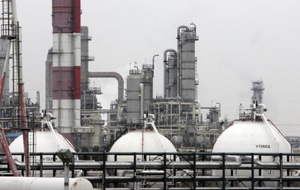Japan, S. Korea oil refiners maximize runs to profit from margins at 5-month highs
SINGAPORE (Reuters) — South Korean and Japanese refiners are running their plants at near-maximum capacity to cash in on profit margins that are at five-month highs, industry sources told Reuters on Friday.
Singapore overall refining margins to Dubai crude rose to $7.34/bbl on July 6, the highest since Feb. 16, amid weaker crude prices and strong demand for oil product such as fuel oil, gasoil and jet fuel.
Japanese refineries were mainly running at above 90% of their capacity from January to May this year compared with below 90% for the same period last year, according to data from the Petroleum Association of Japan.
South Korean refineries had an even higher throughput of 99.1% for the January to May period compared with last year's 96.6%, data from Korea National Oil Corp showed.
"(Margins) were strong because of tight regional inventories, and this shows how solid demand is," said a source from a South Korean refinery who declined to be named due to the sensitivity of the matter.
"There is little reason to trim down the run rates," the source added.
Asia's refinery run rates are expected to increase further in the second half, said Peter Lee, an oil and gas analyst at BMI Research, adding that the pace of incremental fuel demand growth will outstrip refining capacity additions over 2017–2019.
"This will be positive for runs, before the market flips into a refining overcapacity from 2020," he said.
Strong margins were seen across three key refined products, fuel oil, jet fuel and diesel which make up about 40% to 70% of a refinery's output.
"Fuel oil is often treated like a by-product but recently it became the same price or higher than Dubai crude, which means there is no reason to keep run rates low unless you have a planned maintenance," said a trader with a Japanese refinery who declined to be named as he was not authorised to speak with media.
The cost of Dubai crude, the Middle East oil benchmark for Asia refiners that typically process Middle East grades, has dropped 11% to $47.11/bbl since May 25, when the Organization of the Petroleum Exporting Countries (OPEC) said it would extend output cuts.
"(The strength in margins) relies on (product) demand remaining strong and refinery maintenance, both planned and unplanned, remaining elevated. If either disappoint then margins are ripe for a correction," said Virendra Chauhan, analyst at Energy Aspects.
Reporting by Jessica Jaganathan, Seng Li Peng and Mark Tay in SINGAPORE, Jane Chung in SEOUL and Osamu Tsukimori in TOKYO; Editing by Christian Schmollinger







Comments